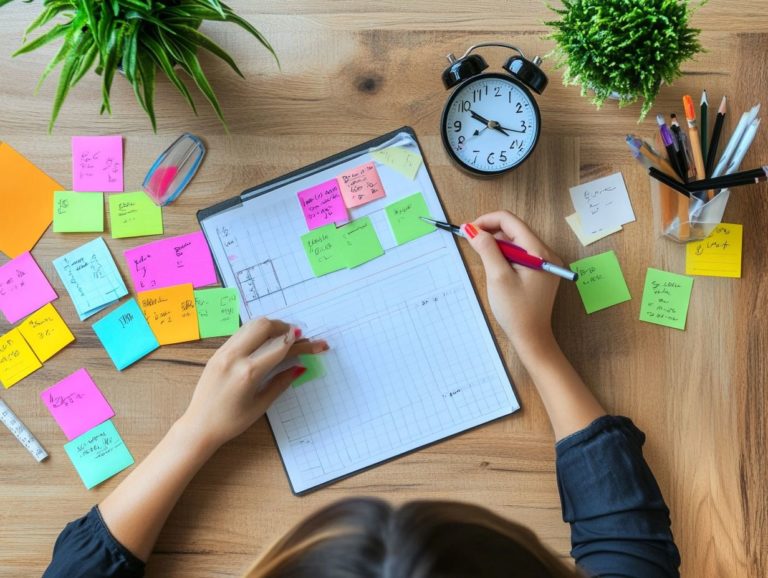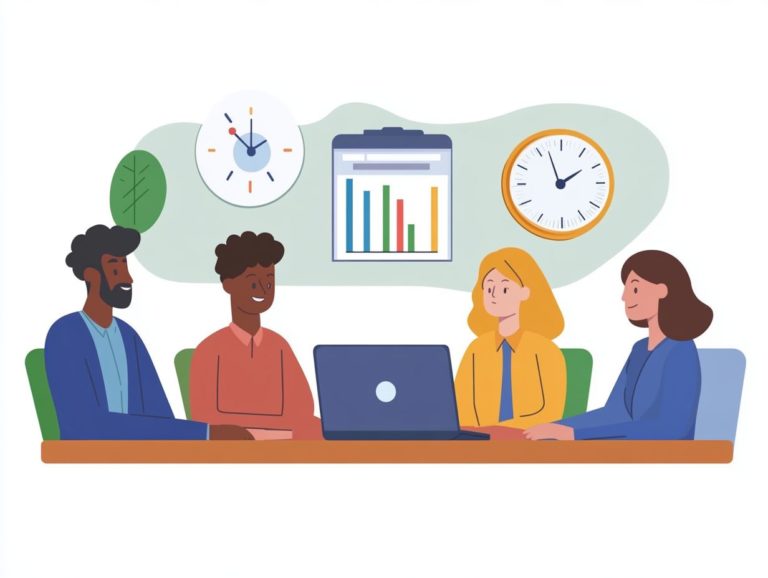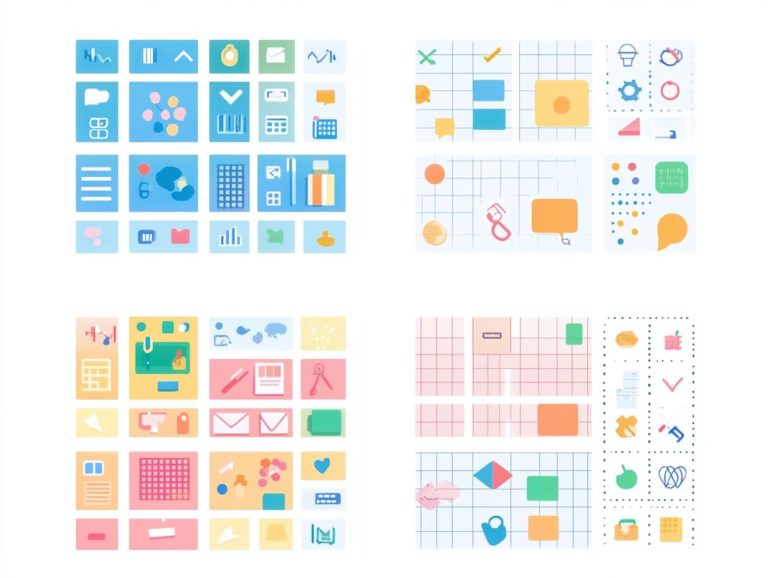The Role of Breaks in Time Management
Time management can feel like a race against the clock. What if taking breaks is the secret to boosting your productivity?
This exploration delves into the crucial role that breaks play in effective time management, supported by scientific research and practical strategies. You ll discover the various types of breaks and dispel some common myths, unveiling how intentional pauses can enhance your focus, energy, and overall mental well-being.
As you navigate the essential balance between work and rest, you ll find a path toward a healthier, more productive life.
Contents
- Key Takeaways:
- The Importance of Time Management
- The Science Behind Breaks
- The Different Types of Breaks
- Strategies for Incorporating Breaks into Your Schedule
- The Benefits of Taking Breaks
- Misunderstandings About Breaks
- Frequently Asked Questions
- Why are breaks important for managing time?
- How often should I take breaks while managing my time?
- What are examples of effective breaks during work or study sessions?
- How long should breaks be to be effective?
- Can taking breaks actually improve my productivity?
- What should I do during my breaks to make them effective?
Key Takeaways:
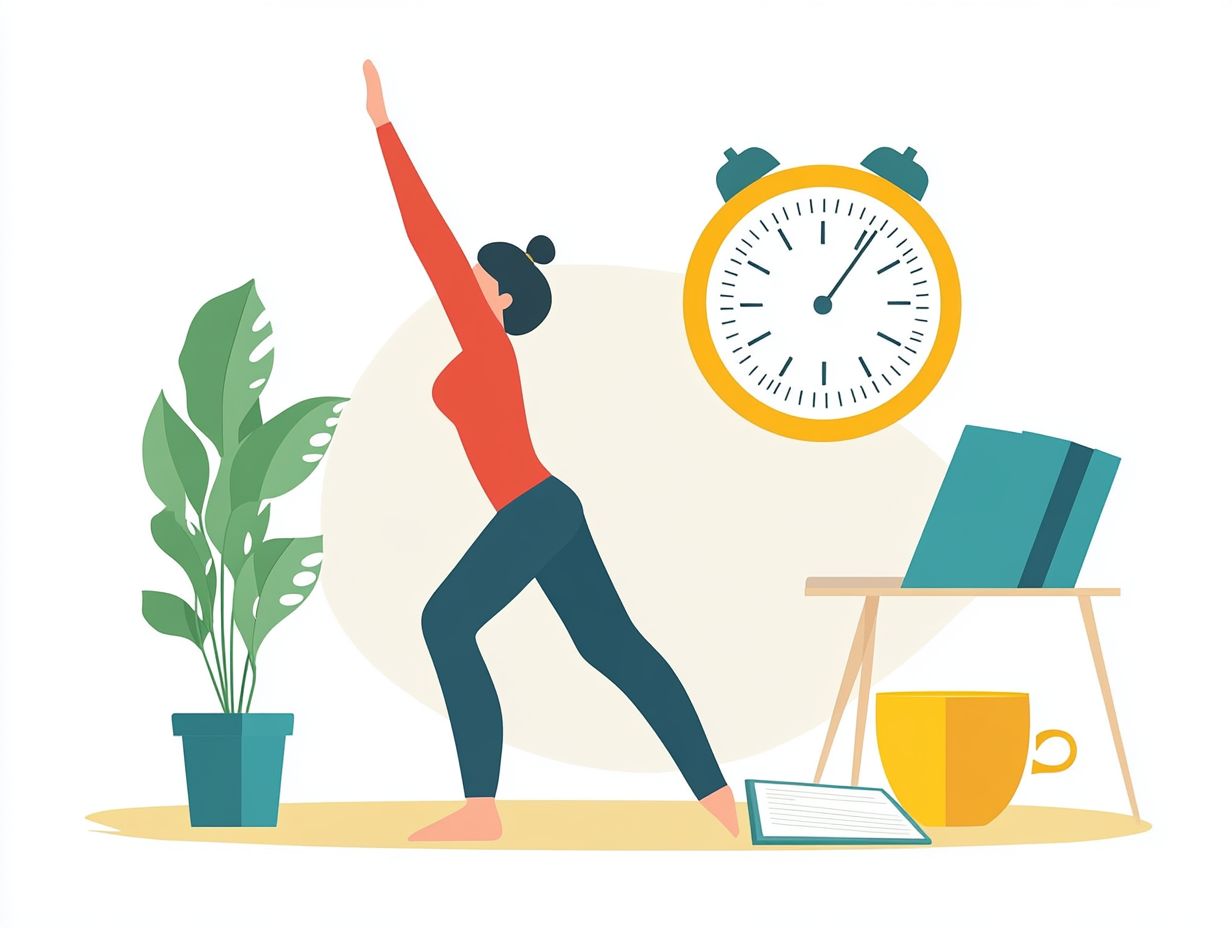
- Breaks are crucial for effective time management.
- Different types of breaks impact focus and stress levels.
- Incorporating breaks improves energy and reduces stress.
The Importance of Time Management
Time management is an essential skill that profoundly influences your productivity and overall work performance. In today s fast-paced environment, demands on your brain power are ever-increasing. Mastering effective time management boosts your efficiency and supports your mental health.
This skill is crucial for CEOs and leaders who juggle multiple responsibilities to ensure both personal fulfillment and organizational success.
Why Breaks are Essential
Taking breaks is essential for maintaining productivity and enhancing your mental health. Effective breaks provide the energy renewal your brain craves after intense work sessions.
These pauses offer you the perfect chance to step back, recharge, and manage the often overwhelming burden of negative emotions that can accumulate during prolonged concentration. Simple activities like stretching, taking a short walk, or enjoying a light snack can do wonders to lighten your cognitive load.
Incorporating social interactions during these breaks such as sharing a laugh with a coworker or calling a friend creates a sense of connectedness that lifts your mood and sharpens your mental clarity.
By recognizing the importance of these restorative moments, you can significantly enhance your overall well-being, paving the way for increased focus and creativity in your tasks.
The Science Behind Breaks
Understanding the science behind breaks is essential; your brain needs periods of rest to operate at its best.
When you engage in focused tasks, your brain expends considerable energy, resulting in cognitive fatigue and a dip in productivity. Research by experts such as Korpela, Kinnunen, Geurts, de Bloom, and Sianoja shows that strategically timed breaks can significantly enhance your mental resources and elevate your overall work performance.
Research on Productivity and Mental Health
Research shows a compelling link between productivity and mental health, highlighting that techniques like the Pomodoro method complete with micro-breaks and longer pauses can significantly enhance your work performance while alleviating stress.
This method involves intervals of focused work, typically lasting 25 minutes, followed by a brief 5-minute break. Such structured intermissions stave off burnout and elevate your cognitive function, allowing your brain to consolidate the information absorbed during those focused work sessions.
Studies reveal that professionals who embrace this technique often report heightened levels of motivation and satisfaction, underscoring its positive influence on overall well-being. By breaking tasks into manageable segments, the Pomodoro method promotes sustained attention and diminishes the overwhelming sensation that often accompanies lengthy projects.
Imagine a more focused you! Are you ready to unlock your productivity potential? Start taking breaks today to boost your productivity and well-being!
The Different Types of Breaks
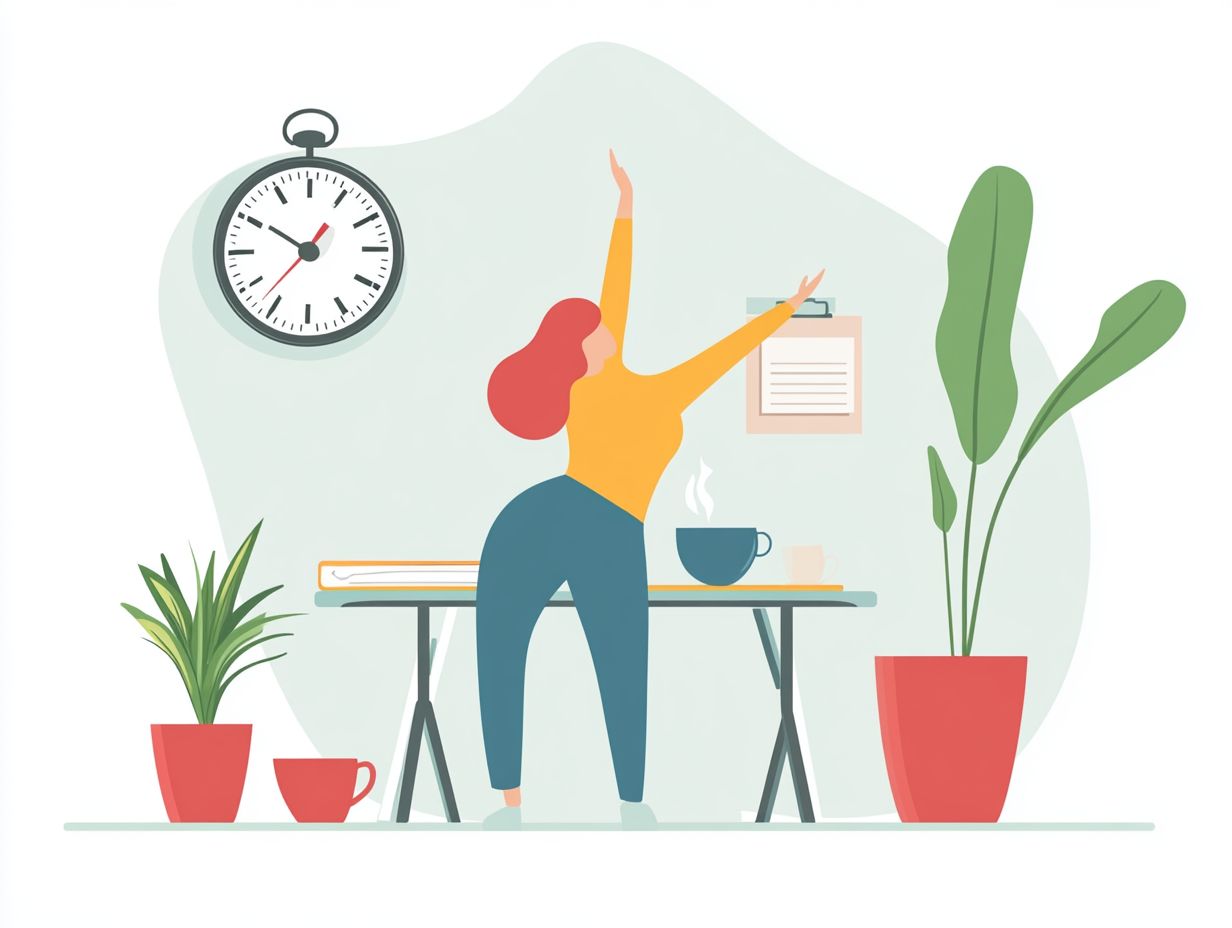
You have a range of break options at your disposal. Each is designed to enhance your work performance and cognitive function.
Short breaks serve as quick respites. They give you the chance to recharge your brain in just a few moments.
In contrast, extended breaks allow for deeper relaxation. You can pursue creative activities that provide mental space to rejuvenate and think outside the box.
Short Breaks vs. Extended Breaks
Short breaks, lasting just a few minutes, and extended breaks, stretching over several hours, are both essential for recharging your brain and enhancing work performance.
Understanding the differences can significantly impact your productivity levels. Short breaks typically last between five to fifteen minutes. They offer a quick mental reset. You can stretch, grab a snack, or practice some mindfulness exercises.
On the other hand, extended breaks can last from around 30 minutes to several hours. They allow for deeper relaxation and rejuvenation.
During these longer breaks, you might choose to take leisurely walks, enjoy meals with colleagues, or even indulge in a short nap. Knowing when to incorporate each type of break can be a game-changer. This can boost your focus and creativity throughout the workday.
Strategies for Incorporating Breaks into Your Schedule
Incorporating breaks into your schedule demands a touch of strategic planning and smart time management. By ensuring that these intervals of rest are intentionally utilized, you can significantly enhance your productivity.
This also curbs the temptation to indulge in less fruitful activities, like aimlessly scrolling through social media.
Tips for Effective Time Management
Effective time management techniques help combat decision fatigue and make the most of your cognitive resources. Consider implementing strategically timed breaks.
By recognizing your natural focus rhythm, you can enhance your productivity and reduce the risk of burnout. One practical method is the Pomodoro Technique, which is a method where you work for 25 minutes and then take a 5-minute break.
This structure promotes sustained attention while encouraging regular refreshment.
Leveraging digital tools like time-tracking applications offers valuable insights into your work patterns. They can help you pinpoint exactly when you need a break.
By deliberately weaving pauses into your schedule, you can rejuvenate your mind and spark creativity, leading to more efficient task completion.
The Benefits of Taking Breaks
The benefits of taking breaks are numerous and profound. They lead to improved focus, a refreshing surge of energy, and a notable decrease in stress and burnout.
These advantages enhance your overall well-being, both in your professional endeavors and personal life.
Improved Focus and Energy
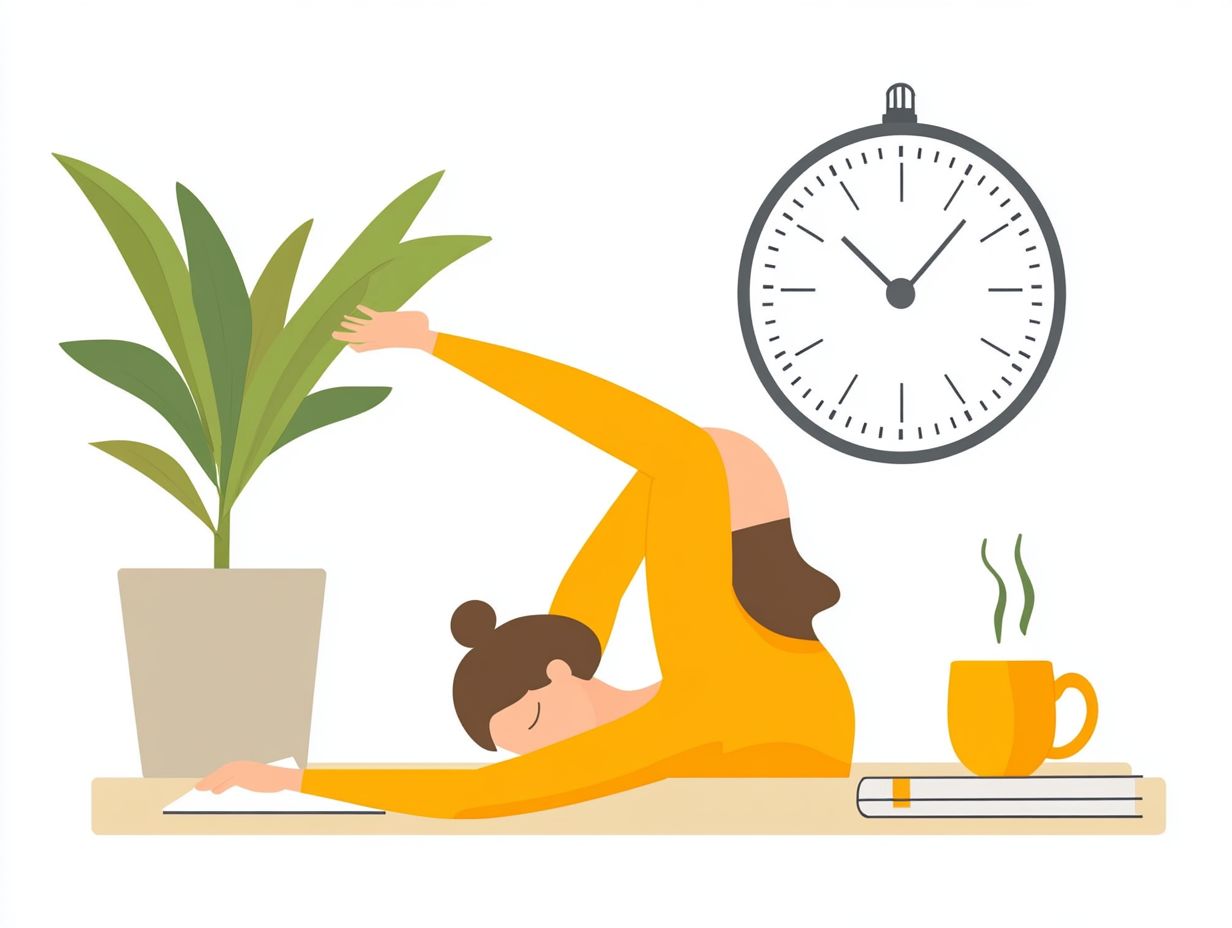
Taking regular breaks can significantly enhance your focus and rejuvenate your energy. This allows you to leverage your cognitive resources more effectively throughout the workday.
Research from the Draugiem Group reveals that working in bursts of 52 minutes followed by 17-minute breaks optimizes productivity. This approach shows that your brain thrives on short intervals of intense focus, complemented by periods of rest.
Embracing this rhythm refreshes your mental capacity and mitigates fatigue. It enables you to tackle tasks with a clearer mindset.
Professionals who implement the Pomodoro Technique reap the rewards of structured work intervals paired with intentional breaks. This results in sustained energy levels and improved performance.
Studies indicate that taking brief pauses can replenish dopamine levels, which are vital for motivation and pleasure. This ultimately fosters a more engaged and productive mindset.
Start taking breaks today and feel the difference in your productivity!
Reduced Stress and Burnout
Incorporating effective breaks into your routine can dramatically reduce stress and burnout, ultimately enhancing your mental health and overall satisfaction with life.
Research suggests that structured breaks can elevate your focus and productivity, giving your mind the opportunity to recharge. A study featured in the Journal of Happiness Studies found that individuals who schedule regular intervals of downtime experience a remarkable 30% reduction in perceived stress levels. These breaks are essential for maintaining energy throughout the day and significantly lower the risk of mental fatigue.
Consider adopting the Pomodoro Technique, a method where you work for 25 minutes and then take a short break of 5 minutes; this approach can boost efficiency by up to 25%. Prioritizing these breaks is crucial for building resilience against the demands of daily life.
Misunderstandings About Breaks
Numerous misconceptions surround breaks and time management, often clouding your understanding of their true impact on productivity. These misunderstandings can foster negative feelings about taking essential pauses, ultimately hindering your performance and well-being.
Dispelling Myths and Misunderstandings
Dispelling myths about breaks is essential for cultivating a culture that values effective downtime as a key element of productivity.
Many believe that taking breaks disrupts workflow and diminishes output. However, research reveals that incorporating regular intervals of respite can boost thinking ability and sustain creativity. Experts emphasize that these brief pauses can significantly improve your focus and sharpen your problem-solving skills.
Studies indicate that individuals who take short mental breaks experience a remarkable increase in their ability to manage complex tasks.
By acknowledging the positive relationship between breaks and productivity, you can help foster a more supportive and effective work environment, benefiting both employees and the organization s bottom line.
Final Thoughts and Recommendations
Don t view breaks as a barrier they are your secret weapon for success! Taking breaks is essential for enhancing your time management and overall work performance.
By weaving short intervals of rest into your daily routine, you can significantly elevate your focus and mental agility. This practice not only alleviates stress but also nurtures your creativity and problem-solving skills.
To effectively incorporate breaks into your work schedule, consider techniques like the Pomodoro Technique or set reminders to step away from your desk every hour.
Engaging in physical activities or mindfulness exercises during these pauses can amplify the benefits. Ultimately, prioritizing downtime paves the way for a more balanced and sustainable work approach.
Frequently Asked Questions
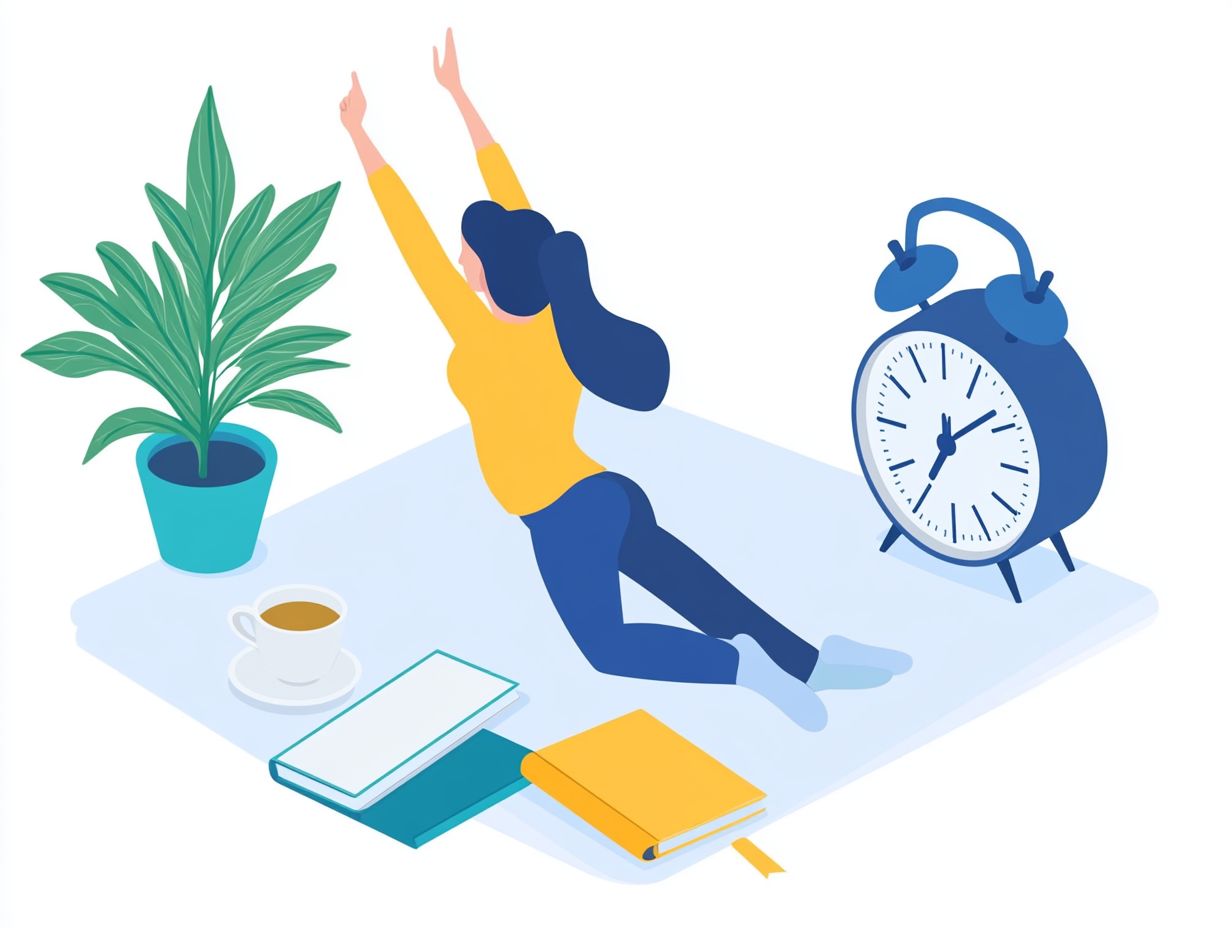
Why are breaks important for managing time?
Breaks provide opportunities for rest and rejuvenation, which can improve focus and productivity. Taking breaks also helps prevent burnout and promotes overall well-being.
How often should I take breaks while managing my time?
This varies for each person, but it is generally recommended to take a short break every 60-90 minutes. Listen to your body and take breaks as needed, especially if you feel fatigued or overwhelmed.
What are examples of effective breaks during work or study sessions?
Effective breaks can include taking a short walk, stretching, listening to music, or engaging in relaxing activities such as meditation or deep breathing. Choose breaks that allow you to disconnect from work and recharge.
How long should breaks be to be effective?
Ideally, breaks should be between 5-15 minutes to allow enough time to rest and recharge without disrupting workflow. Longer breaks of 20-30 minutes can also be beneficial if you have the time.
Can taking breaks actually improve my productivity?
Yes! Taking breaks can supercharge your productivity. It gives you time to rest and recharge, which helps you focus better and avoid feeling exhausted.
Studies show that employees who take regular breaks are more productive and find their jobs more satisfying. So, don t hesitate to take that time for yourself!
What should I do during my breaks to make them effective?
During your breaks, give your mind and body a well-deserved rest. Engage in a different activity or step outside for some fresh air.
Even a few minutes of closing your eyes can help. Avoid work-related tasks like checking emails during this time!


